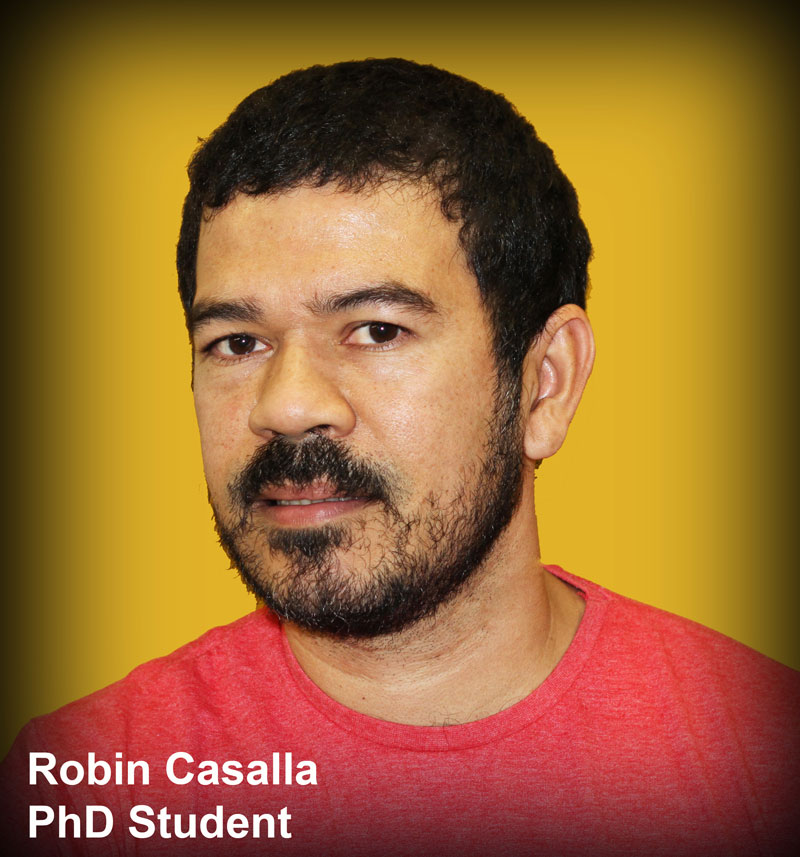Robin Casalla Daza, M.Sc.

University of Freiburg
Biology I, Evolution & Ecology
Hauptstraße 1, Room 1014
D-79104 Freiburg
Phone. ++49/761/203-2578
E-Mail: rcasalla@gmail.com
CV
- 1992
High School diploma. Colegio de Barranquilla para Varones Barranquilla Colombia - 2010
Bachelor of Science (Biology) at the Universidad del Atlántico, Barranquilla Colombia - 2013
Master of Science (Biology) at Escuela Superior Politecnica del Litoral y Centro Nacional de Investigaciones Marinas del Ecuador. Master thesis „ Measurement of genetic distances in populations of white shrimp Litopenaeus vannamei in the Ecuadorian coast ”
Supervisors: Dr. Franklin Perez. ESPOL & Prof. Dr, Filip Volckaert KU Leuven - Since 2013
PhD: „Structure, assamble and distribution of community of termites in tropical dry forest and mangrove ecosystem in the colombian Caribbean Coast”
Supervisor: Prof. Dr. Judith Korb
Research
One most important challenges in tropical ecology is to understand the interactions between the communities of species and the complex environmental variables.
Approximately 67% of all species occur in the tropics, principally in forest. Colombia is one of the privileged tropical countries with a wide diversity of ecosystems and significant number of representative’s taxonomic groups. It has the highest numbers of birds, plants, mammals, amphibians and fishes wordlwide and is listed as one of the planets biodiversity ‘hot spot’. However this privilege demands not only great responsibility for conservation, but also research is required into areas lacking biological information.
Colombia's Caribbean coast is one of the areas where primary information is scarce. At the same time, its ecosystems are highly threatened by deforestation, burning, pollution and agriculture which are reducing wildlife and natural habitats. Ones of its most endangered ecosystems are the Tropical dry forests and mangroves. Tropical dry forest actually occupy less than 1.5 % of its original area while mangroves 30% remain in some Natural Parks. There are some efforts by the Colombian Government to establish protected areas, but it requires more information, in order to propose new zones.
A major gap is the knowledge about arthropods. Insects constitute the largest majority of the Earth’s total species richness, but information on this taxon is scarce in Colombia. Termites constitute a major component of the fauna of tropical forests. They are fundamental in the decomposition of plant organic matter and provide nutrients essential for higher trophical levels.
I am interested in research how communities of termites are structured in tropical ecosystem, such as tropical dry forests and mangrove ecosystem.
What defines the presence, structure and composition of the communities of termites in the tropical dry forests and mangrove ecosystem in the Colombian Caribbean?
What is the evolutionary and phylogenetic relationship between termites in the tropical dry forests and mangrove ecosystem?
These are some of the great questions of ecology and evolutionary biology that I am going to do in my thesis work.
Keywords: Colombia, Tropical dry forest, Mangrove, Termites, Morphometric identification, DNA isolation, PCR/Sequencing, Phylogenetic analysis, Community structure analysis.

